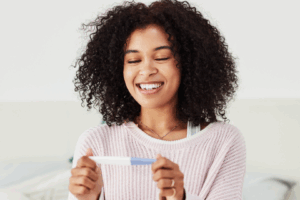Mood swings. Bloating. Headaches. Difficulty concentrating. Imagine if you experienced these symptoms for several days out of every month. For many women, this is their reality. More than 31 million women in the U.S. experience PMS (premenstrual syndrome). Some women only feel several days of mild discomfort before their period. For others, debilitating symptoms can last up to 14 days— taking a toll on their relationships, work, and even self-esteem.
What is PMS?
PMS is a cluster of symptoms that many women experience before their period. These symptoms, which usually wane once their period starts, can include:
- Acne
- Bloating or constipation
- Changes in appetite and cravings for sugary and salty foods
- Feeling tired or irritable
- Headache
- Joint or back pain
- Crying spells, mood swings, or depression
- Reduced sexual desire
- Tender and swollen breasts
- Trouble sleeping and concentrating
- Wanting to be alone
No one knows for sure what causes PMS. The common belief is that it is linked, in part, to changes in hormone levels during the menstrual cycle. Some women say it feels like they’re on an exhausting, unpredictable emotional rollercoaster where all they want to do is crawl into bed and hide from the world.
“Many women think PMS is simply something they have to live with,” says OB/GYN Charlsie Celestine, MD. “But that’s not the case. There are things they can do about it.”
Diagnosis and Treatment
Dr. Celestine typically asks her patients a series of questions about what they experience each month prior to their periods. If their symptoms follow a monthly pattern, it’s almost always PMS, she explains.
Some women are diagnosed with a less common, more severe form of PMS called PMDD (premenstrual dysmorphic disorder). PMDD includes intense PMS symptoms coupled with extreme depression and anxiety, and sometimes even anger or rage. This often requires the addition of a mental health professional to address the mood disorder component.
PMS can’t be prevented or completely avoided. But women can ease their symptoms by making these lifestyle changes:
✔ Eating healthy by following a Mediterranean-style diet
✔ Practicing meditation, yoga, and other mind-body practices to reduce stress
✔ Exercising for at least 30 minutes a day to boost feel-good hormones
✔ Eating more complex carbs and less of the white, sugary stuff
✔ Reducing or eliminating caffeine, which can minimize breast tenderness
✔ Reducing or eliminating alcohol to mitigate mood swings and irritability
✔ Taking birth control pills to help with irritability and breast tenderness, although this may not be right for everyone
“PMS is not something you should have to suffer through,” says Dr. Celestine. “Anything that affects your quality of life for two to 14 days out of the month needs to be addressed, validated, and taken seriously.”
For more information on Women’s Health Specialists of CentraState, visit centrastateobgyn.com or call 866-CENTRA7 (866-236-8727).





